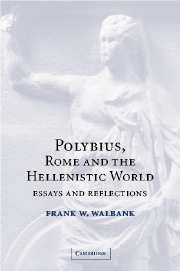Book contents
- Frontmatter
- Contents
- Preface
- Acknowledgements
- List of abbreviations
- 1 Polybian studies, c. 1975–2000
- HISTORICAL AND GEOGRAPHICAL PAPERS
- POLYBIUS AS A HISTORIAN
- POLYBIUS ON ROME
- 16 Supernatural paraphernalia in Polybius' Histories
- 17 ‘Treason’ and Roman domination: two case-studies, Polybius and Josephus
- 18 A Greek looks at Rome: Polybius vi revisited
- TRANSMISSION OF POLYBIUS
- Bibliography
- Indexes
17 - ‘Treason’ and Roman domination: two case-studies, Polybius and Josephus
Published online by Cambridge University Press: 22 September 2009
- Frontmatter
- Contents
- Preface
- Acknowledgements
- List of abbreviations
- 1 Polybian studies, c. 1975–2000
- HISTORICAL AND GEOGRAPHICAL PAPERS
- POLYBIUS AS A HISTORIAN
- POLYBIUS ON ROME
- 16 Supernatural paraphernalia in Polybius' Histories
- 17 ‘Treason’ and Roman domination: two case-studies, Polybius and Josephus
- 18 A Greek looks at Rome: Polybius vi revisited
- TRANSMISSION OF POLYBIUS
- Bibliography
- Indexes
Summary
The sweep of overwhelming Roman military power eastwards confronted members of the ruling class in the states threatened (and eventually absorbed) with desperate problems. How they should (and did) respond depended on several factors, among them the nature and imminence of the threat, current relations with Rome and the degree of ‘national’ consciousness – or self-definition – in any particular state. Few, if any, states, moreover, were monolithic, most containing class and factional divisions, so that one man's compromise with Rome was another man's treason. In judging such compromises the modern historian is liable to be swayed by hindsight and the temptation to make immediate success or failure the overriding criterion. On closer investigation, however, the background of most political decisions is more complicated than at first sight appears; nor is it always possible to establish the circumstances in which they were made. In the present paper I propose to examine two cases, those of Polybius and Josephus, not as a pair of Plutarchean parallel lives, but as two examples of very different figures who had to face, each in his own time and manner, the dilemmas inherent in confronting Rome.
As historians, both illustrate from the evidence in their works as well as from their own lives the impact of Rome upon the states in which they lived.
- Type
- Chapter
- Information
- Polybius, Rome and the Hellenistic WorldEssays and Reflections, pp. 258 - 276Publisher: Cambridge University PressPrint publication year: 2002
- 2
- Cited by



